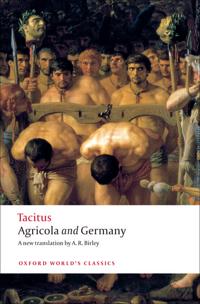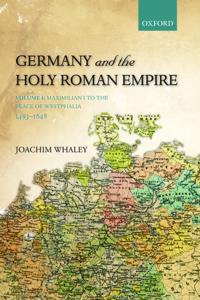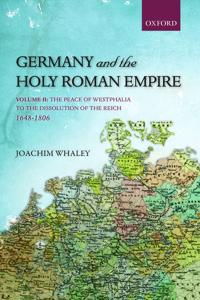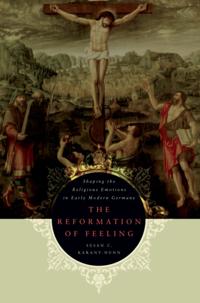Contrasting Prisoners' Rights: A Comparative Examination of England and Germany (Inbunden)
avLiora Lazarus
ISBN: 9780199259830 - UTGIVEN: 2004-03-25After the Expulsion: West Germany and Eastern Europe 1945-1990 (Inbunden)
avPertti Ahonen
ISBN: 9780199259892 - UTGIVEN: 2003-11-06Germany
ISBN: 9780199265978 - UTGIVEN: 2007-01Vivid, succinct, and highly accessible, Heinrich Winkler's magisterial history of modern Germany offers the history of a nation and its people through two turbulent centuries. It is the story of a country that, while always culturally identified with the West, long resisted the political trajectori[...]
Germany
ISBN: 9780199265985 - UTGIVEN: 2007-12Vivid, succinct, and highly accessible, Heinrich Winkler's magisterial history of modern Germany, offers the history of a nation and its people through two turbulent centuries. It is the story of a country that, while always culturally identified with the West, long resisted the political trajectori[...]
Spying on Science: Western Intelligence in Divided Germany 1945-1961 (Inbunden)
avPaul Maddrell
ISBN: 9780199267507 - UTGIVEN: 2006-02-16History of Public Law in Germany 1914-1945, A (Inbunden)
avMichael Stolleis
ISBN: 9780199269365 - UTGIVEN: 2004-03-18Nazi Germany (Pocket)
avJane Caplan
ISBN: 9780199276875 - UTGIVEN: 2008-04-01An authoritative and up-to-date history of Nazi Germany, with each chapter written by an internationally acknowledged expert in the field, covering everything from the ideological origins of Nazism, through the history of politics and society in the 'Third Reich', to the aftermath of National Social[...]
Weimar Germany (Pocket)
avAnthony Mcelligott
ISBN: 9780199280070 - UTGIVEN: 2009-03-19An authoritative and up-to-date history of Weimar Germany, with each chapter written by an internationally acknowledged expert in the field, that throws new light on important areas such as constitutional and social reform, Jewish life, gender and cultural developments.[...]
Bismarck Myth, The: Weimar Germany and the Legacy of the Iron Chancellor (Inbunden)
avRobert Gerwarth
ISBN: 9780199281848 - UTGIVEN: 2005-07-14East German Leadership and the Division of Germany, The: Patriotism and Propaganda 1945-1953 (Inbunden)
avDirk Spilker
ISBN: 9780199284122 - UTGIVEN: 2006-07-13Property and Civil Society in South-Western Germany 1820-1914 (Inbunden)
avJonathan Sperber
ISBN: 9780199284757 - UTGIVEN: 2005-09-22Agricola and Germany (Häftad)
avTacitus
ISBN: 9780199539260 - UTGIVEN: 200903'Long may the barbarians continue, I pray, if not to love us, at least to hate one another.' Cornelius Tacitus, Rome's greatest historian and the last great writer of classical Latin prose, produced his first two books in AD 98. He was inspired to take up his pen when the assassination of Domitian [...]
Germany and the Second World War
ISBN: 9780199542963 - UTGIVEN: 2014-05The Second World War affected the lives and shaped the experience of millions of individuals in Germany - soldiers at the front, women, children, and the elderly sheltering in cellars, slave labourers toiling in factories, and concentration-camp prisoners and POWs clearing rubble in the Reich's deva[...]
Bourgeoisie, State and Democracy: Russia, Britain, France, Germany and the USA (Inbunden)
avGraeme Gill
ISBN: 9780199544684 - UTGIVEN: 2008-05-15Suicide in Nazi Germany
ISBN: 9780199606115 - UTGIVEN: 2015-12The suicides of Hitler, Goebbels, Bormann, Himmler, and later Goering at the end of World War II were only the most prominent in a suicide epidemic that has no historical parallel and that can tell us much about the Third Reich's peculiar self-destructiveness and the depths of Nazi fanaticism. Look[...]
Theology As Science in Nineteenth-Century Germany
ISBN: 9780199641918 - UTGIVEN: 2013-12This study describes the origin, development and crisis of the German nineteenth-century project of theology as science. Its narrative is focused on the two predominant theological schools during this period, the Tubingen School and the Ritschl School. Their work emerges as a grand attempt to synthe[...]
Patent Enforcement in the US, Germany and Japan
ISBN: 9780199679201 - UTGIVEN: 2016-01The United States, Germany, and Japan constitute the three most significant patent systems, but there is considerable variation in procedure and jurisprudence between them. A comparison of these systems for patent enforcement can illuminate historical pathways and contemporary conduits to address co[...]
Germany and the Holy Roman Empire (Pocket)
avJoachim Whaley
ISBN: 9780199688821 - UTGIVEN: 2013-12Germany and the Holy Roman Empire offers a striking new interpretation of a crucial era in German and European history, from the great reforms of 1495-1500 to the dissolution of the Reich in 1806. Over two volumes, Joachim Whaley rejects the notion that this was a long period of decline, and shows i[...]
Germany and the Holy Roman Empire (Pocket)
avJoachim Whaley
ISBN: 9780199688838 - UTGIVEN: 2013-12Germany and the Holy Roman Empire offers a striking new interpretation of a crucial era in German and European history, from the great reforms of 1495-1500 to the dissolution of the Reich in 1806. Over two volumes, Joachim Whaley rejects the notion that this was a long period of decline, and shows i[...]
Germany and the Holy Roman Empire (Inbunden)
avJoachim Whaley
ISBN: 9780199693078 - UTGIVEN: 201111Germany and the Holy Roman Empire offers a new interpretation of the development of German-speaking central Europe and the Holy Roman Empire or German Reich, from the great reforms of 1495-1500 to its dissolution in 1806 after the turmoil of the French Revolutionary and Napoleonic Wars. Going agains[...]
Reformation of Feeling: Shaping the Religious Emotions in Early Modern Germany
ISBN: 9780199741991 - UTGIVEN: 2015-06In The Reformation of Feeling, Susan Karant-Nunn looks beyond and beneath the formal doctrinal and moral demands of the Reformation in Germany to examine the emotional tenor of the programs that the emerging creeds-revised Catholicism, Lutheranism, and Calvinism/Reformed theology-developed for their[...]
Germany in the Loud Twentieth Century (Häftad)
ISBN: 9780199759385 - UTGIVEN: 2011-12Germany in the Loud Twentieth Century seeks to understand recent German history and contemporary German culture through its sounds and musics, noises and silences, using the means and modes of the emerging field of Sound Studies. German soundscapes present a particularly fertile field for investiga[...]
Oberammergau in the Nazi Era: The Fate of a Catholic Village in Hitlers Germany
ISBN: 9780199798773 - UTGIVEN: 2010-04The Bavarian mountain village of Oberammergau is famous for its decennial passion play. The play began as an articulation of the villagers strong Catholic piety, but in the late 19th and early 20th centuries developed into a considerable commercial enterprise. The growth of the passion play from a c[...]
Use and Abuse of Political Asylum in Britain and Germany
ISBN: 9780203499856 - UTGIVEN: 2015-06All European states have the legal right to grant asylum but only Germany is obliged by law to do so. Liza Schuster contributes to the asylum debate primarily in the area of comparative politics in this study of British and German policies on asylum practice.[...]
Hitler and Nazi Germany (Häftad)
ISBN: 9780205846788 - UTGIVEN: 2013-06A brief yet comprehensive survey of the Third Reich This text is based on current research findings and is written for students and general readers who want a deeper understanding of this period in German history. It provides a balanced approach in examining Hitler's role in the history of the Th[...]



























